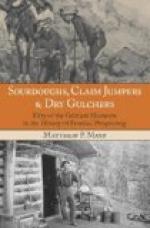The rain hit the roof now in heavy gusts as though some one had dashed it from a pail. The wind whistled through a loosened shingle and rattled around an ill-made joint. Within the house itself some slight sounds of preparation for breakfast sounded the clearer against the turmoil outside. And then Bennington became conscious that for some time he had felt another sound underneath all the rest. It was grand and organlike in tone, resembling the roar of surf on a sand beach as much as anything else. He looked out again, and saw that it was the wind in the trees. The same conditions that had before touched the harp murmur of a stiller day now struck out a rush and roar almost awe-inspiring in its volume. Bennington impulsively threw open the window and leaned out.
The great hill back of the camp was so steep that the pines growing on its slope offered to the breeze an almost perpendicular screen of branches. Instead of one, or at most a dozen trees, the wind here passed through a thousand at once. As a consequence, the stir of air that in a level woodland would arouse but a faint whisper, here would pass with a rustling murmur; a murmur would be magnified into a noise as of the mellow falling of waters; and now that the storm had awakened, the hill caught up its cry with a howl so awful and sustained that, as the open window let in the full volume of its blast, Bennington involuntarily drew back. He closed the sash and turned to dress.
After the first disappointment, strange to say, Bennington became quite resigned. He had felt, a little illogically, that this giving of a whole day to the picnic was not quite the thing. His Puritan conscience impressed him with the sacredness of work. He settled down to the fact of the rainstorm with a pleasant recognition of its inevitability, and a resolve to improve his time.
To that end, after breakfast, he drew on a pair of fleece-lined slippers, donned a sweater, occupied two chairs in the well-known fashion, and attacked with energy the pages of Le Conte’s Geology. This book, as you very well know, discourses at first with great interest concerning erosions. Among other things it convinces you that a current of water, being doubled in swiftness, can transport a mass sixty-four times as heavy as when it ran half as fast. This astounding proposition is abstrusely proved. As Bennington had resolved not to make his reading mere recreation, he drew diagrams conscientiously until he understood it. Then he passed on to an earnest consideration of why the revolution of the globe and the resistance of continents cause oceanic currents of a particular direction and velocity. Besides this, there was much easier reading concerning alluvial deposits. So interested did he grow that Old Mizzou, coming in, muddy-hoofed and glistening from a round of the stock, found him quite unapproachable on the subject of cribbage. The patriarch then stumped over to Arthur’s cabin.




